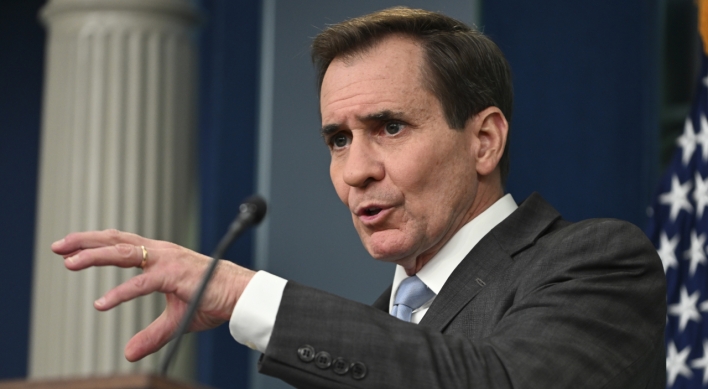Mercedes-Benz halves costs as Gangnam showrooms boom
By Korea HeraldPublished : Oct. 27, 2013 - 19:08
Mercedes-Benz Financial Services Korea Co. slashed borrowing costs by more than 50 percent as record demand for imported cars in Seoul’s Gangnam luxury-goods district spurs its lending business.
The unit of German automotive group Daimler AG sold 130 billion won ($122 million) of two-year notes on Oct. 14 at 3.38 percent, 57 basis points more than similar-maturity government bonds, data compiled by Bloomberg show. That’s lower than both the spread on 2014 securities sold in November of 123 basis points and the average premium for two-year A+ rated finance debt of 73. The sale was expanded by 30 percent to meet demand.
The market share for imported cars in South Korea more than doubled in the past four years to a record 13 percent in August, with Mercedes-Benz making up about 14 percent of that and BMW 24 percent. Their popularity among Seoul’s wealthy was satirized by the use of a red Mercedes SLK 200 in Psy’s ‘Gangnam Style’ video, the world’s most-viewed YouTube clip.
“Institutional investors were competing to buy,” said Kim Se Yong, a credit analyst in Seoul at Shinyoung Securities Co. “Both Mercedes-Benz and BMW Financial Services Korea are luring investors with their comparatively stable asset quality, and that’s a result of their captive market shares.”
The market share for imported cars in Asia’s fourth-biggest economy was 10 percent in 2012 compared with 4.9 percent in 2009, data from the Korea Automobile Importers and Distributors Association show.
Combined car sales by domestic brands including Hyundai and Kia fell 0.6 percent to 1.01 million units for the January-September period, Korea Automobile Manufacturers Association data show. Sales in September dropped 13 percent from a year earlier. By contrast, sales of imported models rose 21 percent to 116,085 units.
Kia Motors Corp. Friday reported profit that missed estimates after a strike cut production and a stronger won curbed its competitiveness in the U.S.
Mercedes-Benz sold 18,584 vehicles in South Korea the first nine months of the year, trailing Bayerische Motoren Werke AG, with 25,088, the KAIDA data show. Volkswagen AG ranked third at 18,511.
The won has strengthened 7.5 percent against the dollar since June 30, the most of 11 major Asian currencies, boosting spending power of the nation’s consumers. It touched a nine-month high yesterday on speculation exporters are repatriating income expecting further appreciation. Korea’s Kospi index of shares has risen 9.8 percent this half.
“More and more South Koreans are looking for imported cars that promise to be more luxurious,” said Shin Chung Kwan, an analyst at KB Investment & Securities Co. “Automakers like BMW and Mercedes-Benz not only offer better quality and have a favorable global brand image, but they also now offer the full line up of engines to lure Korean customers.”
Mercedes-Benz Financial Services Korea, which offers finance to customers of Mercedes-Benz Korea and Daimler Trucks Korea, has recorded average annual sales growth of 32 percent since 2009. Assets totaled 1.28 trillion won as of June, from 721.2 billion won at the end of 2009, according to a regulatory filing.
The Seoul-based company had initially planned to sell 100 billion won of notes this month, according to a Sept. 30 regulatory filing. It received orders for as much as 200 billion won, according to an Oct. 4 regulatory filing.
“Mercedes-Benz Financial Services Korea is following its strategy of further diversification and localization of funding sources,” Managing Director Markus Kuehn said in an e-mailed response to questions.
The company’s focus is on “providing attractive financial products for Mercedes-Benz car and truck customers. The ongoing success of the Mercedes-Benz brand in Korea requires a strong presence in local capital markets.”
Hyundai Motor Co., along with affiliate Kia Motors, controls more than 70 percent of South Korea’s car market. Hyundai Capital Services Inc., the financing arm of Hyundai Motor, last year provided funding to 506,247 new Hyundai and Kia buyers, Financial Supervisory Service data show. The unit sold 40 billion won of three-year 3.21 percent notes last month, a 36 basis-point spread above similar-maturity government bonds, Bloomberg data show.
Average yields on two-year AA- corporate notes have fallen to 3.02 percent from 3.17 percent at the end of June, while yields for similarly rated three-year bonds in Korea average 3.27 percent from 3.36 percent, Bloomberg-compiled data show.
As Korea’s economic growth picks up, the cost of insuring its government’s bonds from non-payment using credit-default swaps is falling. Swaps were at 62 basis points as of Oct. 22, the lowest since March 8 and down 16.5 basis points this month.
Finance units of Daimler and BMW began to sell won bonds in Korea at the end of last year, according to data compiled by Bloomberg. BMW Financial Services Korea Co. borrowed 100 billion won selling 3.9 percent notes due 2015 in December. It also sold 120 billion won of five-year commercial paper in March.
Mercedes-Benz Financial Services Korea’s 260 billion won of issuance this year ranks it equal 36th among sellers of won-denominated corporate notes, according to data compiled by Bloomberg. Sales this month total 2.39 trillion won compared with 5 trillion won in all of September.
“Investors are likely to deem that sales growth of Mercedes-Benz in Korea will have a positive impact” on the company’s credit quality, said Jeong Dae Ho, a credit analyst at KB Investment & Securities Co. “This has resulted in spread tightening.” (Bloomberg)
The unit of German automotive group Daimler AG sold 130 billion won ($122 million) of two-year notes on Oct. 14 at 3.38 percent, 57 basis points more than similar-maturity government bonds, data compiled by Bloomberg show. That’s lower than both the spread on 2014 securities sold in November of 123 basis points and the average premium for two-year A+ rated finance debt of 73. The sale was expanded by 30 percent to meet demand.
The market share for imported cars in South Korea more than doubled in the past four years to a record 13 percent in August, with Mercedes-Benz making up about 14 percent of that and BMW 24 percent. Their popularity among Seoul’s wealthy was satirized by the use of a red Mercedes SLK 200 in Psy’s ‘Gangnam Style’ video, the world’s most-viewed YouTube clip.
“Institutional investors were competing to buy,” said Kim Se Yong, a credit analyst in Seoul at Shinyoung Securities Co. “Both Mercedes-Benz and BMW Financial Services Korea are luring investors with their comparatively stable asset quality, and that’s a result of their captive market shares.”
The market share for imported cars in Asia’s fourth-biggest economy was 10 percent in 2012 compared with 4.9 percent in 2009, data from the Korea Automobile Importers and Distributors Association show.
Combined car sales by domestic brands including Hyundai and Kia fell 0.6 percent to 1.01 million units for the January-September period, Korea Automobile Manufacturers Association data show. Sales in September dropped 13 percent from a year earlier. By contrast, sales of imported models rose 21 percent to 116,085 units.
Kia Motors Corp. Friday reported profit that missed estimates after a strike cut production and a stronger won curbed its competitiveness in the U.S.
Mercedes-Benz sold 18,584 vehicles in South Korea the first nine months of the year, trailing Bayerische Motoren Werke AG, with 25,088, the KAIDA data show. Volkswagen AG ranked third at 18,511.
The won has strengthened 7.5 percent against the dollar since June 30, the most of 11 major Asian currencies, boosting spending power of the nation’s consumers. It touched a nine-month high yesterday on speculation exporters are repatriating income expecting further appreciation. Korea’s Kospi index of shares has risen 9.8 percent this half.
“More and more South Koreans are looking for imported cars that promise to be more luxurious,” said Shin Chung Kwan, an analyst at KB Investment & Securities Co. “Automakers like BMW and Mercedes-Benz not only offer better quality and have a favorable global brand image, but they also now offer the full line up of engines to lure Korean customers.”
Mercedes-Benz Financial Services Korea, which offers finance to customers of Mercedes-Benz Korea and Daimler Trucks Korea, has recorded average annual sales growth of 32 percent since 2009. Assets totaled 1.28 trillion won as of June, from 721.2 billion won at the end of 2009, according to a regulatory filing.
The Seoul-based company had initially planned to sell 100 billion won of notes this month, according to a Sept. 30 regulatory filing. It received orders for as much as 200 billion won, according to an Oct. 4 regulatory filing.
“Mercedes-Benz Financial Services Korea is following its strategy of further diversification and localization of funding sources,” Managing Director Markus Kuehn said in an e-mailed response to questions.
The company’s focus is on “providing attractive financial products for Mercedes-Benz car and truck customers. The ongoing success of the Mercedes-Benz brand in Korea requires a strong presence in local capital markets.”
Hyundai Motor Co., along with affiliate Kia Motors, controls more than 70 percent of South Korea’s car market. Hyundai Capital Services Inc., the financing arm of Hyundai Motor, last year provided funding to 506,247 new Hyundai and Kia buyers, Financial Supervisory Service data show. The unit sold 40 billion won of three-year 3.21 percent notes last month, a 36 basis-point spread above similar-maturity government bonds, Bloomberg data show.
Average yields on two-year AA- corporate notes have fallen to 3.02 percent from 3.17 percent at the end of June, while yields for similarly rated three-year bonds in Korea average 3.27 percent from 3.36 percent, Bloomberg-compiled data show.
As Korea’s economic growth picks up, the cost of insuring its government’s bonds from non-payment using credit-default swaps is falling. Swaps were at 62 basis points as of Oct. 22, the lowest since March 8 and down 16.5 basis points this month.
Finance units of Daimler and BMW began to sell won bonds in Korea at the end of last year, according to data compiled by Bloomberg. BMW Financial Services Korea Co. borrowed 100 billion won selling 3.9 percent notes due 2015 in December. It also sold 120 billion won of five-year commercial paper in March.
Mercedes-Benz Financial Services Korea’s 260 billion won of issuance this year ranks it equal 36th among sellers of won-denominated corporate notes, according to data compiled by Bloomberg. Sales this month total 2.39 trillion won compared with 5 trillion won in all of September.
“Investors are likely to deem that sales growth of Mercedes-Benz in Korea will have a positive impact” on the company’s credit quality, said Jeong Dae Ho, a credit analyst at KB Investment & Securities Co. “This has resulted in spread tightening.” (Bloomberg)
-
Articles by Korea Herald





![[Music in drama] Rekindle a love that slipped through your fingers](http://res.heraldm.com/phpwas/restmb_idxmake.php?idx=644&simg=/content/image/2024/05/01/20240501050484_0.jpg&u=20240501151646)




![[New faces of Assembly] Architect behind ‘audacious initiative’ believes in denuclearized North Korea](http://res.heraldm.com/phpwas/restmb_idxmake.php?idx=644&simg=/content/image/2024/05/01/20240501050627_0.jpg&u=20240502093000)








